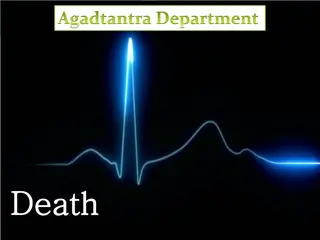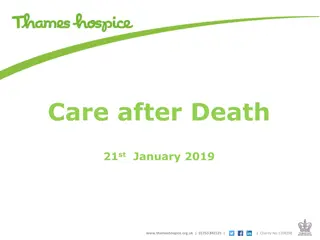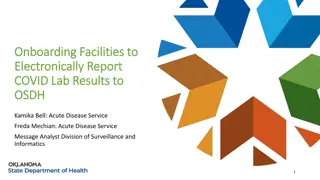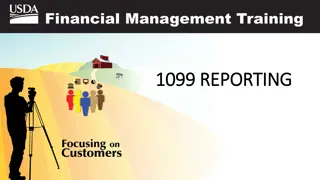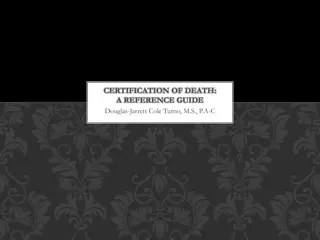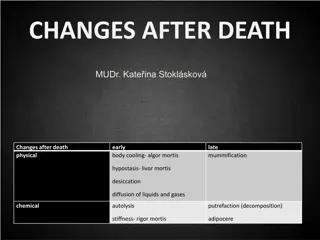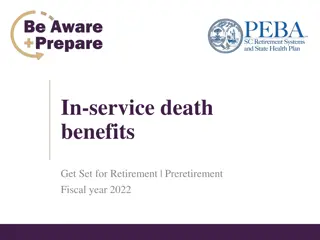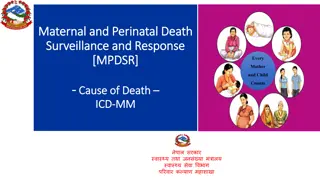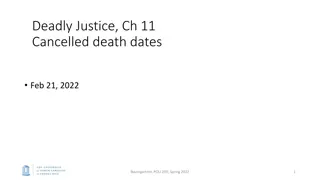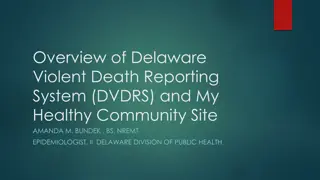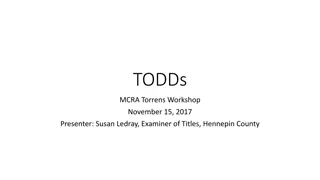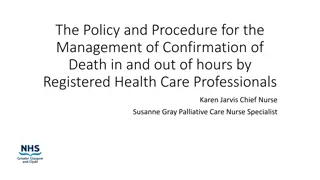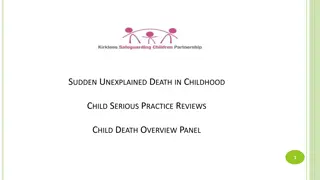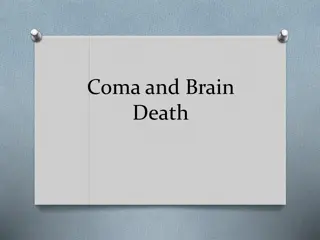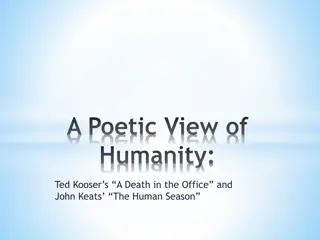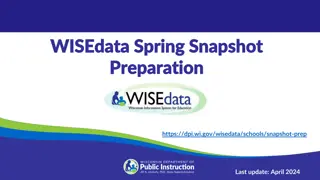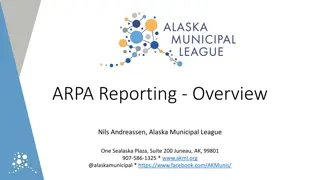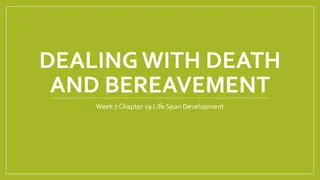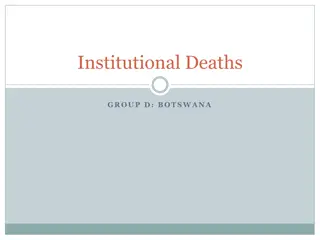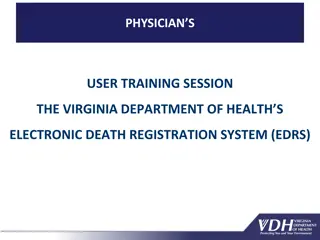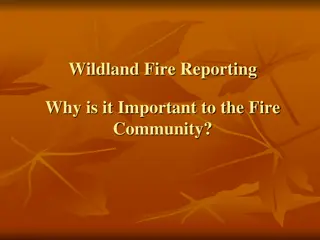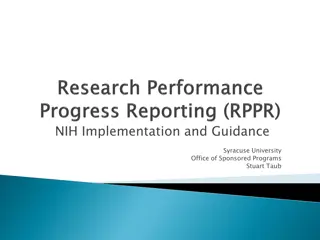Legal Challenges and Ethical Dilemmas Surrounding Death Determination Criteria
Legal challenges and ethical dilemmas persist worldwide regarding the determination of death using neurological criteria. Courts grapple with defining clear distinctions between life and death, especially when exceptions are requested for specific cases. Recent cases like the Archie Battersbee case
1 views • 40 slides
ECC Social Value Reporting and Evaluation Framework
Essex County Council (ECC) has implemented a robust Social Value Reporting and Evaluation framework based on the Local Government Association's National TOMs method. This framework categorizes and assesses social value contributions in two parts - Value Score and Supporting Statement Score - to deri
3 views • 16 slides
Arkansas State Death in Custody Reporting Implementation
The Arkansas Department of Finance and Administration oversees the reporting of death in custody incidents as mandated by federal and state laws. The State Administering Agency collaborates with reporting entities to submit quarterly Death in Custody Reports to the Bureau of Justice Assistance. A St
4 views • 18 slides
Understanding Death and Dying in Human Life
Exploring the interdisciplinary field of thanatology, this chapter delves into the phases of transitioning from life to death, the definition of death in modern society, and how individuals of different ages perceive and cope with the concept of death. It discusses the importance of providing care a
1 views • 10 slides
Agadtantra Department
Death is defined as the irreversible cessation of life, marked by the stoppage of vital organ functions. The diagnosis of death includes clinical criteria like absence of pulse and respiration. Stages of death encompass somatic and molecular death, each with distinct characteristics. Different modes
1 views • 35 slides
Importance of Timely Verification in Care After Death
Understanding the verification process and importance of timely verification in care after death is crucial for improving the experience of death and dying for families. This session covers the definitions, process, and care after death, emphasizing the significance of timely verification in end-of-
1 views • 15 slides
Legal Entitlements and Responsibilities in the Event of a Partner's Death
In the event of a partner's death, the legal representative of the deceased partner is entitled to obtain various amounts from the firm, such as capital, share of goodwill, profits, reserves, and more. The deceased partner's capital will be charged with certain amounts as well. This includes calcula
3 views • 7 slides
Streamlining Electronic Reporting of COVID Lab Results to OSDH
This documentation outlines the process of electronically reporting COVID lab results to the Oklahoma State Department of Health (OSDH). It covers the purpose, available options, specifications, formats, and the onboarding and testing process, aiming to accelerate the reporting of healthcare facilit
0 views • 9 slides
Overview of 1099 Reporting Systems
The 1099 Reporting Systems consist of MINC, EARN, and SPPS, which are used for IRS 1099 reporting purposes. These systems handle transactions and generate Form 1099 for recipients based on predefined criteria. Taxpayers are responsible for accurate reporting to the IRS, with reporting thresholds set
0 views • 15 slides
Death Certification: A Comprehensive Guide for Clinicians
This reference guide delves into the purpose and responsibilities associated with death certification, covering topics such as completing the death certificate, pronouncement of death, and the clinician's role. It emphasizes the importance of accurate documentation for national statistics, medical r
3 views • 33 slides
Insights on Changes After Death and Definition of Death in Medical Science
Explore the physical changes that occur after death, such as body cooling, mummification, and putrefaction. Learn about the traditional and modern criteria for determining death, including somatic and brain death. Delve into the complexities of cellular death and the implications for organ transplan
1 views • 26 slides
UNEP Support for Improving UNCCD Reporting Procedures
UNEP has been providing support since 2010 to enhance the reporting processes of the UNCCD, focusing on streamlined funding approaches, technical assistance, and capacity building. Key outcomes include the development of reporting tools, online reporting systems, and building credible data from coun
0 views • 14 slides
Reflections on Death in John Donne's Poetry
John Donne's poem "Death, be not proud" challenges the conventional view of death as a fearsome force. The speaker addresses Death directly, asserting that it is not as mighty or dreadful as some believe. Instead, Death is portrayed as a servant to fate, chance, kings, and desperate men. The poem ex
0 views • 19 slides
Climate Change Monitoring, Reporting, and Verification (MRV) Training Session Overview
This document outlines the purpose and reporting requirements for the development of a Climate Change Monitoring, Reporting, and Verification (MRV) system, focusing on projections and scenarios. It highlights the importance of collecting information for climate mitigation, assisting Serbia in meetin
0 views • 19 slides
Transitioning to Incident-Based Crime Reporting: Enhancing Transparency and Accountability
Anytown Police Department (APD) is leading the transition from Summary Reporting to Incident-Based Reporting through the National Incident-Based Reporting System (NIBRS). This change promotes transparency, provides detailed crime data to the public, and improves statewide and national crime statisti
3 views • 17 slides
Insights into Structured Reporting Practices in Colorectal Cancer Imaging
A survey conducted by Dr. Eric Loveday at North Bristol NHS Trust revealed the current landscape of structured reporting in MRI and CT scans for rectal and colon cancer. Results indicate a positive outlook towards implementing national standards for structured radiology reporting, with an emphasis o
0 views • 7 slides
Reflections on Death and Existence: A Philosophical Perspective
Philosophers have long debated the concept of death, considering it as a propitious misfortune or an inevitable end that deprives individuals of future experiences. Whether viewed as a divine decree or a statistical marvel, the existence of human life adds complexity to the evaluation of death's inh
0 views • 16 slides
Comprehensive Guide to In-Service Death Benefits and Retirement Planning
Discover the in-service death benefits available for active members, including refunds of contributions, monthly benefits, and incidental death benefits. Learn about programs such as SCRS and PORS, the State ORP, and the PORS Accidental Death Program. Find out how your designated beneficiary can rec
0 views • 7 slides
Understanding Maternal and Perinatal Death Surveillance and Response
Explore the causes and classification of maternal and perinatal deaths, emphasizing the importance of determining the primary, contributory, and final causes of death. Learn how to categorize maternal deaths according to ICD-MM and perinatal deaths according to ICD-PM classifications. Delve into the
0 views • 61 slides
Analysis of Death Penalty Procedures in Pennsylvania and Other States
The content provides insights into the death penalty procedures in Pennsylvania, highlighting the requirements for issuing death warrants and the appeal processes. It contrasts Pennsylvania's approach, where executions are rare despite death warrants being issued, with other states like Florida and
0 views • 8 slides
Overview of Delaware Violent Death Reporting System (DVDRS) and My Healthy Community Site
Delaware Violent Death Reporting System (DVDRS) is a state-based surveillance system that reports data in the National Violent Death Reporting System. Data is collected from death certificates, medical examiner, and law enforcement reports, focusing on the location of the injury. Demographic and cir
0 views • 9 slides
Understanding Transfer on Death Deeds in Real Estate Planning
This content discusses scenarios related to Transfer on Death Deeds (TODDs) in real estate planning, covering aspects such as joint tenancy, survivorship, multiple beneficiaries, and the impact of death on property ownership. The analysis explores the effectiveness of TODDs in different situations a
0 views • 21 slides
Policy and Procedure for Confirmation of Death by Health Care Professionals
In May 2017, a policy change led to allowing trained Healthcare Professionals to verify death in all situations. The Confirmation of Death (CoD) policy empowers Registered Health Care Professionals to confirm death, while medical staff handle the Medical Certification of Cause of Death (MCCD). The p
0 views • 13 slides
Understanding Sudden Unexpected Death in Childhood (SUDIC)
Sudden Unexpected Death in Childhood (SUDIC) refers to the sudden and unexplained death of a child, often referred to as Sudden Unexpected Death in Infancy (SUDI) or Sudden Infant Death Syndrome (SIDS). While the exact causes of SIDS are unknown, there are ways to reduce the risk, such as safe sleep
0 views • 23 slides
Understanding Coma, Brain Death, and the Examination Process
Exploring the definitions of coma and altered consciousness, understanding brain death examinations, criteria for determining brain death, who can perform the exam, Texas law on the definition of death, and components of a brain death exam. Learn about different states of altered consciousness, the
0 views • 14 slides
Contrasting Perspectives on Death: Kooser's A Death in the Office vs. Keats' The Human Seasons
Ted Kooser's "A Death in the Office" and John Keats' "The Human Seasons" present differing views on mortality. Kooser portrays death as a routine process, while Keats sees it as a natural phase of life. Despite not explicitly mentioning death, both poems evoke contemplation on the inevitability of o
0 views • 12 slides
Analysis of Loneliness, Nature, and Death in "She Dwelt Among the Untrodden Ways" by William Wordsworth
The poem "She Dwelt Among the Untrodden Ways" by William Wordsworth explores the themes of loneliness, nature, and death through the story of a woman named Lucy. The poet vividly describes Lucy's secluded existence, her beauty akin to a hidden violet, and the impact of her death on his own life. Thr
0 views • 24 slides
Simpler Systems Reporting Pilot for Financial Data Enhancement
The Simpler Systems Reporting Pilot is underway to enhance financial data reporting at the university campus. Led by Vice President Ryan Nesbit's team, this initiative aims to improve University-wide financial reporting mechanisms and accessibility to data through the Simpler tool. The pilot include
0 views • 5 slides
Overview of WISEdata Snapshot Preparation and Reporting Requirements
The WISEdata Snapshot Preparation provides crucial details on data entry, validation, and reporting processes for educational institutions. It outlines the importance of accurate data collection for federal reporting, public reporting, and funding determinations. Additionally, the Snapshot Reporting
0 views • 41 slides
Ensuring Chemical Reporting and Preparedness at the DEQ
The Chemical Reporting and Preparedness section at the DEQ focuses on regulations under EPCRA, prompted by incidents like the Bhopal tragedy. EPCRA covers Tier II reporting, spill reporting, LEPCs, State Emergency Response Commission, and Oklahoma Hazardous Materials Emergency Response Commission. T
0 views • 17 slides
ARPA Reporting Overview and SLFRF Guidelines in Alaska
This document outlines the reporting overview for the ARPA (American Rescue Plan Act) and specific guidelines for the Coronavirus State and Local Fiscal Recovery Fund (SLFRF) in Alaska. It covers acceptance, use, and reporting of funds, as well as designating staff roles for managing reports. The co
2 views • 22 slides
Conquering Sin and Death Through Sacrifice and Prophecy
The fall of humanity into sin, Satan, and death led to a prophecy of enmity between the woman and the devil in Genesis 3:15. Through His death, Christ conquered the power of death and the devil, fulfilling the prophecy. Scriptural passages from Hebrews and John further illustrate His purpose and vic
0 views • 18 slides
Understanding Death and Bereavement Across Cultures
Explore the diverse attitudes and customs regarding death, implications of the mortality revolution, coping mechanisms for dying and grieving, and challenges faced in mourning various losses. Delve into cultural perspectives on hastening death and overcoming fear of dying, along with hypothetical qu
0 views • 15 slides
Exploring the Concept of Death in Art and Literature
Death, often depicted as a skeletal figure with a scythe, symbolizes the power that ends life. It is associated with themes of decay, inevitability, and the transient nature of existence. Through personification and metaphors, artists and poets convey the profound impact of death on life and nature,
0 views • 4 slides
Feedback Analysis on Medication Incident Reporting in Hospitals
Feedback received from IMSN members on NIMS and incident reporting revealed various issues affecting the rates at which staff report medication incidents/near misses within hospitals. Major themes included staffing numbers and turnover, pharmacist involvement in incident reporting, clinical pharmacy
0 views • 12 slides
Enhancing Death Registration Process in Botswana
Strategies to address bottlenecks in institutional deaths in Botswana include decentralizing coding, simplifying ICD processes, enhancing staff training, strengthening partnerships, and increasing coding staffing. The death registration process involves reporting in health facilities, coding and dat
0 views • 7 slides
Electronic Death Registration System (EDRS) Overview
An Electronic Death Registration System (EDRS) allows participants to electronically register various types of death certificates, providing a paperless, timely, secure, and accurate process. Users can create death certificates, complete them, assign cases, request certification, and more, resulting
0 views • 4 slides
Importance of Wildland Fire Reporting to the Fire Community
Wildland fire reporting plays a critical role in providing accurate data for effective fire management. Defined state fires and challenges in reporting impact funding, risk management, and agency support. Comprehensive reporting like the Wildland Fire Occurrence Reporting for Massachusetts is essent
0 views • 6 slides
Streamlining Research Progress Reporting for NIH Awards
Research Performance Progress Report (RPPR) is a standardized mechanism to facilitate interim progress reporting for NIH-funded projects, aiming to enhance consistency and minimize administrative burdens. It replaces the eSNAP process for certain types of awards and fellowship grants. RPPR includes
0 views • 12 slides
Understanding Death and the Afterlife According to Biblical Perspectives
Exploring the concept of physical death as the separation of soul from the body, this overview delves into biblical descriptions of death including terms like sleep, departing, and going down into silence. It also delves into the certainty of physical death for all individuals, the conquest of death
0 views • 23 slides




